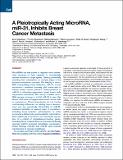A Pleiotropically Acting MicroRNA, miR-31, Inhibits Breast Cancer Metastasis
Author(s)
Valastyan, Scott John; Reinhardt, Ferenc; Benaich, Nathan; Calogrias, Diana; Szász, Attila M.; Wang, Zhigang C.; Brock, Jane E.; Richardson, Andrea L.; Nathan Benaich; Weinberg, Robert A; ... Show more Show less
DownloadValastyan-2009-A Pleiotropically Ac.pdf (2.573Mb)
PUBLISHER_POLICY
Publisher Policy
Article is made available in accordance with the publisher's policy and may be subject to US copyright law. Please refer to the publisher's site for terms of use.
Terms of use
Metadata
Show full item recordAbstract
MicroRNAs are well suited to regulate tumor metastasis because of their capacity to coordinately repress numerous target genes, thereby potentially enabling their intervention at multiple steps of the invasion-metastasis cascade. We identify a microRNA exemplifying these attributes, miR-31, whose expression correlates inversely with metastasis in human breast cancer patients. Overexpression of miR-31 in otherwise-aggressive breast tumor cells suppresses metastasis. We deploy a stable microRNA sponge strategy to inhibit miR-31 in vivo; this allows otherwise-nonaggressive breast cancer cells to metastasize. These phenotypes do not involve confounding influences on primary tumor development and are specifically attributable to miR-31-mediated inhibition of several steps of metastasis, including local invasion, extravasation or initial survival at a distant site, and metastatic colonization. Such pleiotropy is achieved via coordinate repression of a cohort of metastasis-promoting genes, including RhoA. Indeed, RhoA re-expression partially reverses miR-31-imposed metastasis suppression. These findings indicate that miR-31 uses multiple mechanisms to oppose metastasis.
Date issued
2009-06Department
Massachusetts Institute of Technology. Department of Biology; Whitehead Institute for Biomedical Research; Koch Institute for Integrative Cancer Research at MITJournal
Cell
Publisher
Elsevier B.V.
Citation
Valastyan, Scott, Ferenc Reinhardt, Nathan Benaich, Diana Calogrias, Attila M. Szász, Zhigang C. Wang, Jane E. Brock, Andrea L. Richardson, and Robert A. Weinberg. “A Pleiotropically Acting MicroRNA, miR-31, Inhibits Breast Cancer Metastasis.” Cell 137, no. 6 (June 2009): 1032–1046. © 2009 Elsevier Inc.
Version: Final published version
ISSN
00928674